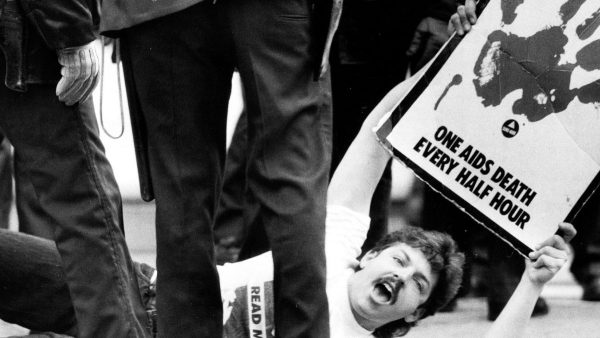
On this World AIDS Day, Dec 1, 2021, former members of AIDS Coalition To Unleash Power Los Angeles (ACT UP/LA) announced their plans to launch an ACT UP/LA Oral History Project to capture the historic AIDS activism in the Los Angeles area from 1987 to 1997. Mary Lucey, Nancy MacNeil, Jordan Peimer, Helene Schpak and Judy Ornelas Sisneros spent the past year planning the project whose goal is to document the movement that dominated the gay community throughout the Los Angeles area for a decade, a galvanizing undertaking that demanded healthcare, dignity, and human rights for thousands of those diagnosed HIV+ or with AIDS. ACT UP Los Angeles was a non-violent direct-action group that gathered at Plummer Park in West Hollywood during the presidency of Ronald Reagan, whose administration blatantly refused to acknowledge the growing AIDS crisis. AIDS had grown into an epidemic since the CDC’s first June 5, 1981 report of the new disease in five gay men in Los Angeles (Originally called Gay-Related Immune Deficiency or GRID.)
This anti-gay prejudice and deliberate short-sightedness caused thousands to become infected and to die due to neglect, greed and social stigma. Both the public and private healthcare sectors, as well as cultural and religious institutions, intentionally assisted and collaborated in the escalation of the AIDS epidemic and AIDSphobia. Activists took a stand to confront and demand redress of attitudes like those of Los Angeles County Supervisor Pete Schabarum, when he dismissed the recommendations of the County AIDS Commission stating: “If you were to poll the man on the street, I think you would find the vast majority of the public really has no interest in the subject of AIDS and certainly could care less about the public financing, the needed programs that you’ve articulated.” ACT UP/Los Angeles was one of the earliest chapters and differed from those in many of the other cities around the world.
Notable differences include its intense focus not only on the provision of a dedicated public AIDS ward which L.A County was notorious for lacking, but also exceptional were ACT UP/LA’s focus on women’s and prisoner’s lives. ACT UP/LA marched on federal buildings, state buildings, LA County and City government offices, insurance companies, hospitals, churches, prisons, political fundraisers, the movie and television industries, homes of bigots and traveled out of town to protest in Congress, the pharmaceutical industry, the insurance industry, the CDC, FDA, NIH, international AIDS conferences, and presidential campaigns and conventions. Personal accounts of former ACT UP/LA activists will be preserved online so that people will learn the inside history of the organization’s actions and why members refused to sit back while they themselves, their family and/or friends and people in other marginalized communities were sick and dying.
In the 10 years of the group’s activism, the ACT UP/LA slogan “ACTION = LIFE” was put into constant practice. Interviews of former members have already taken place, each providing hours of personal histories of participation in constant activism while enduring endless cycles of grief. A sample of outtakes from three interviews can be seen at the ACT UP LA Oral History website: actupla.org . This project is expected to take an estimated 2-3 years, exceeding 100 interviews when completed. Begun over a year ago, although partly inspired by the similarities and differences between the AIDS crisis and the COVID-19 epidemic, the ACT UP/LA Oral History Project was mainly motivated by the continuing deaths of ACT UP/LA members whose histories have not been preserved. “Not only were voices silenced by AIDS, but we are now continually at risk of losing the stories of the people who championed their fight — some with HIV/AIDS, some without — but all people who put their lives and freedom on the line to address this loss,” says Oral History Project member Nancy MacNeil. She adds, “We need to ensure the stories get told by the voices that lived them. Everyone has the right to be the author of their own history.
To paraphrase poet Dylan Thomas: ‘Let those that raged hard have their moment in the light, they did not go gently into the night.’” ACT UP/LA’s many successes include o Forcing the LA County Board of Supervisors to add the first AIDS ward to County/USC Medical Center. o Pressuring the California Department of Corrections to address the healthcare needs of prisoners with AIDS. o Getting the first compassionate release for a woman with AIDS imprisoned in the United States. o Working in coalition with other ACT UP chapters around the country to expand the CDC’s AIDS definition to include opportunistic infections in women. o Challenging Hollywood’s AIDSphobia at the 1991 Academy Awards because the film industry failed to address the AIDS crisis.
This action helped to erode negative Hollywood stereotypes of the queer community in mainstream media. The creation of Clean Needles Now, the region’s first needle exchange program and predecessor of today’s LA Community Health Project. Los Angeles was in fact the nation’s first city to secure government funding for a needle exchange program. The ACT UP/LA Oral History Project is in great need of donations to fund this important collection of interviews. Without committed financial support many histories of the aging community of Los Angeles AIDS activists will not be captured and preserved. We are currently in conversation with several nationally accredited archival institutions. We want to ensure access not only for historians and researchers, but the public as well. For more information go to: actupla.org or contact actuplaoralhistory@gmail.com
